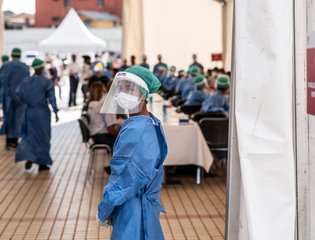Humanitarian and development organisations worldwide have increasingly focused on two key goals: being evidence driven and locally led. In this piece, we highlight how participatory evidence and learning methods can help humanitarian and development organisations simultaneously make their work more evidence driven and locally led.
What do evidence driven and locally led mean?
For Mercy Corps, being ‘evidence driven’ means using data, evidence and analytics to improve our programmes and influence others. Being ‘locally led’ as an international non-governmental organisation (INGO) involves intentionally shifting power to the communities where we operate while still providing targeted support and collaboration that are driven by the priorities of local and national actors.
We believe the two goals above can be achieved by prioritising community agency in the process of generating and using evidence, while also leveraging the expertise and access of INGOs to help facilitate mutually beneficial, locally led learning.
Mercy Corps’ approach to participatory methods
Mercy Corps prioritises participatory research methods and participatory monitoring and evaluation (M&E) that ensure community insights, priorities and knowledge are central throughout a programme’s evidence lifecycle.
From community-defined indicators to participatory action research, these methods allow for deeper engagement and more effective adaptation to local contexts across the evidence lifecycle. For example, in our recent study Participatory Adaptations in the COVID-19 Era (PACE), we found that by ensuring community voices and agency are central to all evidence generation before the pandemic struck, it enabled programmes to better adapt to new risks and constraints and set the stage for communities and local practitioners to own these adaptations after programmes ended.
Participatory methods in action: outcome journals
One example of participatory methods in action at Mercy Corps is the Contributing to the Mitigation of Conflict over Natural Resources (COMITAS) programme in Nigeria funded by the European Union. This programme aims to mitigate conflict over natural resources between farmer and herder communities in Taraba and Adamawa, including through community-based Natural Resource Management Committees (NRMCs).
The programme uses outcome journals as a monitoring tool in which participants collectively define progress markers and observe changes over time, focusing on attitudes, behaviours, knowledge and norms rather than activities and outputs.
Ultimately, the outcome journals in COMITAS enable the NRMC members to identify for themselves what changes to measure within the programme, lead the process of data collection and analysis, and recommend actionable steps towards achieving the desired changes. The outcome journals also serve as a platform through which community members can directly and regularly engage with the programme team.
COMITAS also demonstrates how participatory methods can be integrated into existing community structures and programme processes (in this case the existing activities of the NRMCs) and foster sustainability since the NRMCs can continue monitoring their own progress beyond the programme lifecycle.
This collaboration illustrates how INGOs like Mercy Corps and communities can engage in trust-based collaborations that are mutually beneficial. In this case, Mercy Corps’ global research team and the COMITAS programme team provided guidance and thought partnership on the outcome journal methods and processes, holding space for the community members serving on the NRMCs to define their own priorities and approaches for achieving them.
What next?
Reflecting on our learning from PACE and COMITAS, three key areas require further exploration to effectively implement participatory methods in efforts to influence the humanitarian and development sectors to be both more evidence driven and more locally led:
- Supporting the values and know-how needed to implement participatory methods Practitioners across the humanitarian and development sector need a solid understanding of why meaningful participation in evidence and learning is crucial and how to practically implement participatory approaches. Beyond simply refining methodological skills, effectively mainstreaming participatory evidence and learning will include supporting practitioners in the development of core behaviours that foster collaboration and inclusion: curiosity, humility and active listening.
- Keeping the knowledge and priorities of local change-makers at the heart of participatory evidence and learning
There is a risk that as participatory methods become more widely accepted as default MEL (Monitoring, Evaluation and Learning) and research practices, they may become overly focused on upward-reporting priorities within discrete donor-supported projects rather than supporting longer-standing evidence needs within local governance processes and civil society efforts. A related risk is that a focus on participatory evidence may crowd out local knowledge and ways of knowing that do not fit neatly alongside hegemonic notions of ‘rigour’ that inform many discussions of evidence-driven programming. Over the year ahead, we are actively exploring how to effectively mitigate these potential unintended consequences, building on and aligning with emerging insights from initiatives such as Everyday Peace Indicators and the Inclusive Rigor Co-Lab among many others. - Fostering meaningful, trust-based collaborations for evidence and learning
While participatory methods ultimately aim to maximise local actors' power and agency, INGOs like Mercy Corps should approach their own role in deploying these methods with deep self-awareness and humility. Future learning should focus on how best to forge equitable partnerships for participatory evidence and learning that harness the contributions of both communities and INGOs to support locally led initiatives without undermining community agency, as demonstrated by the outcome journals in COMITAS.
By ensuring community voices are at the centre of evidence generation and learning processes, and actively including participants throughout, participatory methods offer a path for humanitarian and development organisations to support locally led efforts that foster inclusion, collaboration, trust and accountability.

